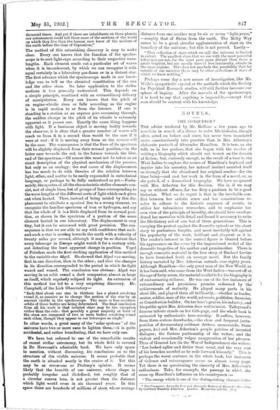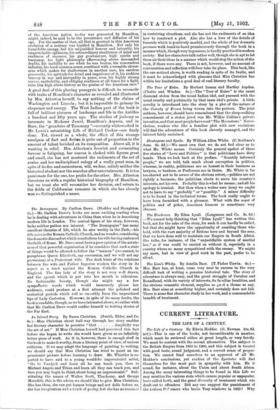NOVELS.
THE CONQUEROR.•
THE advice tendered by Mr. Balfour a few years ago to novelists in search of a theme to write life-histories, though often acted on before and since, has never been translated more conscientiously into practice than in Mrs. Atherton's elaborate portrait of Alexander Hamilton. It is true, as she tells us in her preface, that she began with the resolve of writing a biography which should not trench on the domain of fiction; but, curiously enough, as the result of a tour to the West Indies to explore the scenes of Hamilton's boyhood and inquire into his ancestry, her natural instinct asserted itself so strongly that she abandoned her original resolve—for the time being—and cast her work in the form of a novel, or, as she puts it, of a dramatised biography. We have no quarrel with Mrs. Atherton for this decision. She is, if we may say so without offence, far too fiery a partisan to be a good historian. What we do regret is that in the inevitable con- flict between her artistic sense and her conscientious re- solve to adhere to the historic sequence of events, to utilise her voluminous researches, and to emphasise her own view of the principle of heredity, she should have overbur- dened her narrative with detail and found it necessary to write the life-history not of one but of three generations. This is carrying the protest against the dramatic episode or the short story to portentous lengths, and must inevitably tell against the popularity of the work, brilliant and eloquent as it is. The reader's interest in the central figure is blunted before his appearance on the scene by the impassioned recital of the domestic tragedies of his mother and grandmother. There is enough romantic material in the love story of Rachael Levine to have furnished forth an average novel. But the family history narrated by Mrs. Atherton extends over eighty years. Although Hamilton—the only great man of the New World, as it has been said, who came from the West Indies—was cut off at the age of forty seven, the material available for his biography is of embarrassing richness. He was one of the few instances of extraordinary and precocious promise redeemed by the• achievements of maturity. He played many parts in his short life, and played them all brilliantly, whether as trader, orator, soldier, man of the world, advocate, politician, financier, or Constitution-builder. On her hero's genius, his industry, and his public spirit Mrs. Atherton does well to insist. Talleyrand's famous tribute stands on her title-page, and the whole book is animated by enthusiastic hero-worship. It suffers, however,
from three serious drawbacks,—the close and frequent juxta- position of documentary evidence (letters, memoranda, State papers, &c.) and Mrs. Atherton's purple patches of invented dialogue; the furious partisanship of the writer; and the' violent and occasionally vulgar exaggeration of her phrases.- Thus of General Lee (in the War of Independence) she writes : " Lee looked uglier and dirtier than usual, and the very seat of his breeches scowled as he rode forward leisurely." This is perhaps the worst sentence in the whole book, but instances of violence and extravagance occur on almost every page. Yet there is no questioning the sincerity of Mrs. Atherton's enthusiasm. Take, for example, the passage in which she sums up Hamilton's influence on his countrymen :— " The energy which is one of the distinguishing characteristics
• The Conqueror: being the True and Romantic History of Alexander Bo maiton. By Gertrude Franklin Atherton. London : Macmillan and Co. 163.1
of the American nation to-day was generated by Hamilton, might, indeed, be said to be the persistence and diffusion of his ego. For the matter of that, all that is greatest in this American evolution of a century was typified in Hamilton. Not only his formidable energy, but his unqualified honour and integrity, his unquenchable optimism, his extraordinary nimbleness of mind and readiness of resource, his gay good-nature, high spirits and buoyancy, his light philosophy effervescing above unsounded depths, his inability to see when he was beaten, his remorseless industry, his hard common-sense, combined with a versatile clever- ness which makes for shallowness in another race, his careless generosity, his aptitude for detail and impatience of it, his reckless bravery in war and intrepidity in peace, even his highly strung nerves, excitability, and obliging readiness at all times for a fight, raise him high above history as the genius of the American race."
A good deal of this glowing panegyric is difficult to reconcile with traits of Hamilton's character as revealed and illustrated
by Mrs. Atherton herself, to say nothing of the claims of Washington and Lincoln ; but it is impossible to gainsay its eloquence and energy. The West Indian part of the book is full of brilliant pictures of landscape and life in the Antilles a hundred and fifty years ago. The studies of jealousy as incarnate in Madame Jumel, Hamilton's Aspasia, and in Burr, the " grandsire of Tammany "—recently whitewashed in Mr. Lewis's astonishing Life of Richard Croker—are finely done. Yet, viewed as a whole, the effect of this strange amalgam of fact and fiction is quite out of proportion to the amount of talent lavished on its composition. Above all, it is wanting in relief. Mrs. Atherton's feverish and coruscating fervour is fatiguing, her canvas is choked with figures great and small, she has not mastered the rudiments of the art of praise, and her undisciplined eulogy of a really great man, in spite of its fire and earnestness, will, we fear, satisfy neither the
historical student nor the searcher after entertainment. It is too passionate for the one, too prolix for the other. Mrs. Atherton
threatens us with a regular historical biography of Hamilton, but we trust she will reconsider her decision, and return to the fields of Californian romance in which she has already won so distinguished a name.











































 Previous page
Previous page